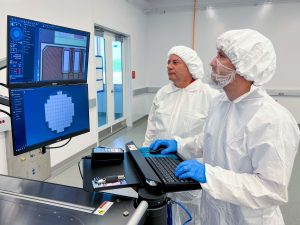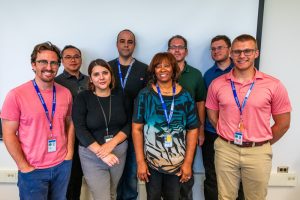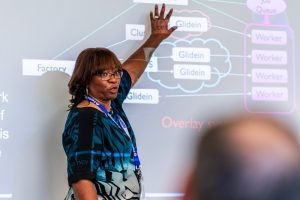Scientists’ collaborative approach to conducting state-of-the-art particle physics experiments makes the U.S. Department of Energy’s Fermi National Accelerator Laboratory an excellent place for students and educators to partake in science, technology, engineering and mathematics.
Every year, Fermilab’s Teacher Research Associates program, or TRAC, invites outstanding science, math, computer science and technology teachers to the laboratory to conduct hands-on, personalized research projects. Since 1983, this program has paired teachers with Fermilab experts, who welcome educators to their laboratory spaces and share their technical knowledge.
“Teachers come to the lab and work with a scientist or engineer to see what research at Fermilab is like,” said Harry Cheung, the head of TRAC and a senior scientist who works on the Compact Muon Solenoid detector at CERN.
TRAC participants experience scientific research side-by-side with Fermilab scientists and engineers and learn how to use the right tools and equipment needed for their projects. Teachers can also attend lectures, tours and seminars to learn more about the lab’s research portfolio and methods of scientific investigation.

Teacher Daniel Jalkut (right) commissioned a probe station that will perform quality control for timing devices for the CMS particle detector at CERN. Jalkut’s mentor, Fermilab scientist Frank Chlebana (left), observes his work. Photo: Ted Liu, Fermilab
Fermilab’s education programs support the professional development and intellectual growth of teachers, which in turn positively impact their students. Teachers gain a more nuanced perspective of the STEM field by experiencing how scientists work and where they work. In turn, they can bring this perspective to the classroom and help inspire the next generation of STEM professionals.
“They’re learning something completely new, things they have never done before,” said Cheung. “It takes time for them to get up to speed on the technical language, so they really feel like they are students again.”
Last year’s TRAC cohort comprised eight teachers: Brian Burcham, Leyden High School District 212; Anita Debarlaben, University of Chicago Laboratory Schools; Dominic Fallico, Geneva High School; Daniel Jalkut, Chicago International Charter School – Northtown Academy; David Kao, Hinsdale Central High School; Josilyn Valencia, Trinidad Garza Early College High School in Dallas, Texas now at Little Village Lawndale High School; Nick Vanderpool, The Bronx High School of Science, NY; and Christian Wimber, East Aurora High School.

Last year’s cohort of TRAC participants comprise eight teachers. From left to right: Daniel Jalkut, Chicago International Charter School – Northtown Academy; David Kao, Hinsdale Central High School; Josilyn Valencia, Little Village Lawndale High School; Christian Wimber, East Aurora High School; Anita Debarlaben, University of Chicago Laboratory Schools; Brian Burcham, Leyden High School District 212; Nick Vanderpool, The Bronx High School of Science; Dominic Fallico, Geneva High School. Photo: Dan Svoboda, Fermilab
Their scope of work ranged from artificial intelligence for cosmology to installing neutrino detector components and fabricating devices for the CMS particle detector at the Large Hadron Collider.
Debarlaben is a 2021 state finalist for the Presidential Award for Excellence in Mathematics and Science Teaching.
“I worked with Fermilab’s TARGET program, which gives students who are underrepresented in STEM exposure to different careers with the hopes of improving enrollment in college and in the workforce,” said Debarlaben. For the second half of her TRAC experience, Debarlaben worked on code to help researchers increase transparency and security, and gain insights on their systems.
Debarlaben said she plans on using the skills she developed at Fermilab to provide teachers with the right resources to bring computer science into their classrooms.

Teacher Anita Debarlaben shares her work at the final presentation of the TRAC program at Fermilab. Photo: Dan Svoboda, Fermilab
“One of the nice things about this program is that we like to develop good relationships with the education community,” said Frank Chlebana, a TRAC mentor and senior scientist at Fermilab. “We strive to provide a positive experience for the teachers so they become our ambassadors and encourage their students to pursue a career in a STEM related field.”
The application period for the 2024 TRAC program is open from Jan. 8 through Feb. 18. Interested teachers should visit the TRAC webpage for more details.
Fermi National Accelerator Laboratory is supported by the Office of Science of the U.S. Department of Energy. The Office of Science is the single largest supporter of basic research in the physical sciences in the United States and is working to address some of the most pressing challenges of our time. For more information, please visit science.energy.gov.



